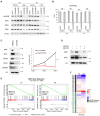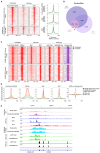This is a preprint.
The SAGA acetyltransferase module is required for the maintenance of MAF and MYC oncogenic gene expression programs in multiple myeloma
- PMID: 38585845
- PMCID: PMC10996596
- DOI: 10.1101/2024.03.26.586811
The SAGA acetyltransferase module is required for the maintenance of MAF and MYC oncogenic gene expression programs in multiple myeloma
Update in
-
The SAGA acetyltransferase module is required for the maintenance of MAF and MYC oncogenic gene expression programs in multiple myeloma.Genes Dev. 2024 Sep 19;38(15-16):738-754. doi: 10.1101/gad.351789.124. Genes Dev. 2024. PMID: 39168636 Free PMC article.
Abstract
Despite recent advances in therapeutic treatments, multiple myeloma (MM) remains an incurable malignancy. Epigenetic factors contribute to the initiation, progression, relapse, and clonal heterogeneity in MM, but our knowledge on epigenetic mechanisms underlying MM development is far from complete. The SAGA complex serves as a coactivator in transcription and catalyzes acetylation and deubiquitylation. Analyses of datasets in the Cancer Dependency Map Project revealed many SAGA components are selective dependencies in MM. To define SAGA-specific functions, we focused on ADA2B, the only subunit in the lysine acetyltransferase (KAT) module that specifically functions in SAGA. Integration of RNA-seq, ATAC-seq, and CUT&RUN results identified pathways directly regulated by ADA2B include MTORC1 signaling, MYC, E2F, and MM-specific MAF oncogenic programs. We discovered that ADA2B is recruited to MAF and MYC gene _targets, and that MAF shares a majority of its _targets with MYC in MM cells. Furthermore, we found the SANT domain of ADA2B is required for interaction with both GCN5 and PCAF acetyltransferases, incorporation into SAGA, and ADA2B protein stability. Our findings uncover previously unknown SAGA KAT module-dependent mechanisms controlling MM cell growth, revealing a vulnerability that might be exploited for future development of MM therapy.
Keywords: ADA2B; MAF; MYC; SAGA complex; SANT domain; multiple myeloma; oncogenic gene expression programs.
Conflict of interest statement
Conflicts of Interest The authors declare no competing interests to disclose.
Figures






Similar articles
-
The SAGA acetyltransferase module is required for the maintenance of MAF and MYC oncogenic gene expression programs in multiple myeloma.Genes Dev. 2024 Sep 19;38(15-16):738-754. doi: 10.1101/gad.351789.124. Genes Dev. 2024. PMID: 39168636 Free PMC article.
-
The MYC-MAF-SAGA axis drives oncogenic gene expression in multiple myeloma.Genes Dev. 2024 Sep 19;38(15-16):693-694. doi: 10.1101/gad.352186.124. Genes Dev. 2024. PMID: 39168637 Free PMC article. Review.
-
The KAT module of the SAGA complex maintains the oncogenic gene expression program in MYCN-amplified neuroblastoma.Sci Adv. 2024 May 31;10(22):eadm9449. doi: 10.1126/sciadv.adm9449. Epub 2024 May 31. Sci Adv. 2024. PMID: 38820154 Free PMC article.
-
Subunits of ADA-two-A-containing (ATAC) or Spt-Ada-Gcn5-acetyltrasferase (SAGA) Coactivator Complexes Enhance the Acetyltransferase Activity of GCN5.J Biol Chem. 2015 Nov 27;290(48):28997-9009. doi: 10.1074/jbc.M115.668533. Epub 2015 Oct 14. J Biol Chem. 2015. PMID: 26468280 Free PMC article.
-
_targeting the SAGA and ATAC Transcriptional Coactivator Complexes in MYC-Driven Cancers.Cancer Res. 2020 May 15;80(10):1905-1911. doi: 10.1158/0008-5472.CAN-19-3652. Epub 2020 Feb 24. Cancer Res. 2020. PMID: 32094302 Free PMC article. Review.
References
-
- Alzrigat M, Parraga AA, Jernberg-Wiklund H. 2018b. Epigenetics in multiple myeloma: From mechanisms to therapy. Semin Cancer Biol 51: 101–115. - PubMed
-
- Bergsagel PL, Kuehl WM. 2003. Critical roles for immunoglobulin translocations and cyclin D dysregulation in multiple myeloma. Immunological Reviews 194: 96–104. - PubMed
Publication types
Grants and funding
LinkOut - more resources
Full Text Sources
